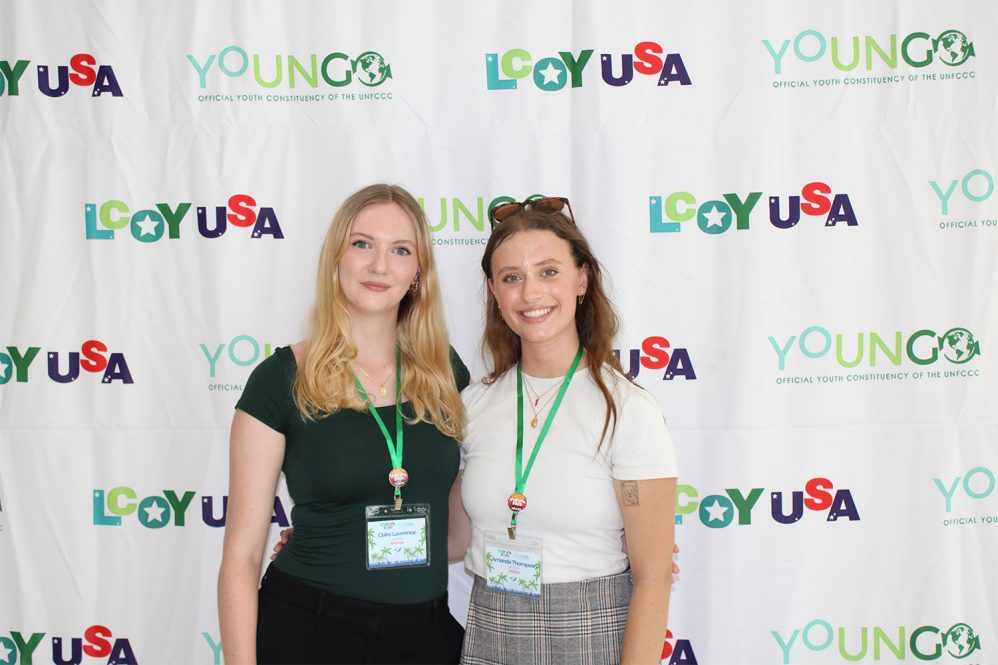Each year, the United Nations Framework Convention on Climate Change (UNFCCC) holds a Conference of Parties (COP) to discuss the current status of global actions on climate change, and future steps to take. Leading up to the COP, youth from over 70 countries convene as part of the Local Conference of Youth (LCOY) program to develop a Global Youth Statement (GYS) to be presented to world leaders at the COP.
As participants, youth delegates gain insight into the benefits and challenges inherent in working in a large decision-making group, while giving them a platform to add youth voices to the global efforts to confront the climate crisis.
This year, UConn student Claire Lawrence ’26 (CLAS) ’27 (MPP) was selected to participate in the LCOY USA, along with 149 other youth delegates, to draft the National Youth Statement (NYS), in a conference held on August 1-3 in Miami, Florida.
Lawrence met with UConn Today to discuss her experiences as an LCOY USA delegate.
Can you describe the program and what it works to achieve?
The local conference is the official UNFCCC-endorsed UN climate conference for youth. One hundred and fifty youth delegates were selected from across America, and we all met over two and a half days to draft the National Youth Statement.
The document contains policy demands, split between domestic policy and sub-domestic policy. We also have an international section with demands that we want to include in the global youth statement for all countries to implement during their time at COP, if they choose. The NYS will go to anyone who wants to hear it. It's been sent to national and local policymakers who would like to hear from America’s youth on climate.
Our NYS will be combined with other national youth statements to form the Global Youth Statement in late November before the COP, which is in Brazil this year, where the statement will be presented.
What was your experience at the conference like?
I interacted with individuals from throughout the United States. The first day we also met with representatives from organizations around Miami. Miami is considered Ground Zero for climate change in the United States due to its extreme vulnerability to rising sea levels. We learned about what Miami is doing to combat climate change from these organizations, and were able to bring back ideas to our own states.
Additionally, on the first day of the conference, LCOY hosted a panel with different professionals, including Trigg Taley, Chris Dragisic, and Betty Osceola, to gain advice from people who have been working in the field their whole lives.
The next day, we split into different subgroups based on our U.S. regions. This is because the United States is incredibly large and diverse, and it would be hard for us to all get together and implement the same policies in regions that are very different geographically, socially, and politically.
I was in the Northeast group, and we had a big brainstorming session based on what we want to see in our region, our experiences with municipal and state government. We shared challenges and successes to better conceptualize policies we planned to propose.
Each of the five different regions drafted individual policy proposals and then we came together and put the proposals together to make a domestic policy sheet.
What was it like to work with 149 other passionate youth climate leaders?
It was a lot of sitting in groups, talking things out, throwing out ideas, and then using everyone's different experiences to workshop and wordsmith them to see what's realistic or not. It was difficult, but it was really constructive.
I was impressed by how many diverse perspectives there were and how easily we were able to combine our ideas. There was a spirit of healthy debate and a lot of delegates with great ideas, but we had limited time. Within the United States, there are so many various schools of thought. Even in a group of like-minded people, you have totally different perspectives and cultures, which was just so cool to see, because you don't have the opportunity very often to interface like this.
Luckily, I had the opportunity to present my policy idea to about 200 people. In short, my policy is about data and making a system within the United States that preserves environmental data and makes sure that it's factual. I heard some great insights and additions from around the room that built my proposal from just an idea to a fully-fledged demand. I could not have done it without the other delegates.
Did anything about the process of crafting the new statement leave lasting impressions or influence future directions for you?
When I proposed my policy on environmental data in the United States, I didn't know quite how to word it, or what it was going to be like. I just had an idea of what I wanted from the United States. I brought it up, and then from there, it bounced around and people offered their expertise within multiple aspects of policymaking.
This process showed me what creating policy really looks like. Although I take public policy classes as part of my major, a lot of the content is very general, so having a hands-on experience like this is indispensable. It absolutely contributed to my aspirations to one day become a policymaker and implement the changes that youth like us dream about at conferences like LCOY.
LCOY is all youth organized. It's hard to put on a conference like this, and they focused on making it as accessible as possible. This is because youth voices are arguably the most important voices in climate discussions. We are the ones who will experience Earth as it changes, for the better or worse. LCOY reminded me that there are many young people across the United States who still care about the environment and are willing to fight for it. In the words of Betty Osceola, who spoke at LCOY, we do not inherit this land from our ancestors, we borrow it from our children.



